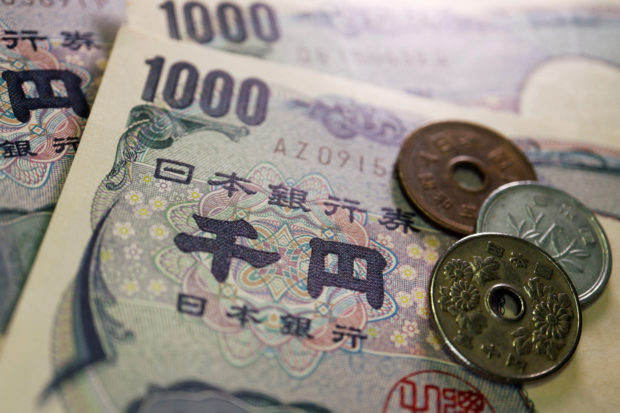Even yen bears unnerved by latest slide as Tokyo ramps up warnings

FILE PHOTO: Coins and banknotes of Japanese yen are seen in this illustration picture taken June 16, 2022. REUTERS/Florence Lo/Illustration
LONDON/NEW YORK -The precipitous slide in Japan’s currency has run so far and fast it’s spooking big investors, and some are cutting bets that it will decline further, anticipating policymakers may soon step in to try and arrest the freefall.
Those who have sold the yen short have reaped juicy profits this year. It slumped to a 24-year low on Wednesday and has lost some 30 percent since the beginning of last year as U.S. interest rate expectations have gone up and Japanese rates have gone nowhere.
But this week’s almost 3 percent drop, without any particular trigger, was enough for some funds to call time on the first leg of their wager that Japan would have to quit its policy of capping bond yields as its global peers push rates higher.
“We think we are getting close to an inflection point of policy,” said BlueBay Asset Management chief investment officer Mark Dowding, especially as inflation starts to pick up.
“We have maintained a short stance in JGBs as an expression of this and today have actually moved long yen,” he said, referring to the government bond market.
“We think the slide in the yen has gone too far too fast and we think that we will hear something from policymakers pretty soon.”
Uneasy calm in the market after a two-session selling storm suggests the feeling is perhaps more widespread, or at least that yen shorts are wary of adding to their positions.
Positioning data shows yen shorts have been reduced steadily since April.
“We’re not shorting the yen anymore and we’re not long,” said Akshay Kamboj, co-chief investment officer at hedge fund Crawford Ventures.
“We’re just breathing and watching – whenever we see the right indicators, we will take some action.”
Government officials have been toughening verbal threats of intervention and issued their strongest warning to date on Thursday. Without action, however, the yen was left vulnerable at about 144 to the dollar.
“The big 1998 dollar/yen high at 147.66 … is the natural target,” said Deutsche Bank strategist Alan Ruskin, adding intervention risks would increase as it neared. “It would not be surprising to see substantial yen longs set up on its approach.”
Momentum
The yen has not been alone in sliding lately as the U.S. dollar has zoomed to multi-decade highs on the euro and sterling on a combination of risk aversion and interest rate expectations.
But it has suffered most because Japan is alone among major economies in enforcing near-zero interest rates while the rest of the world scrambles to hike them to contain inflation.
After years of huge asset buying failed to push inflation to its 2 percent target, the Bank of Japan adopted yield curve control in 2016, where it guides short-term interest rates at -0.1 percent and the 10-year bond yield about 0 percent.
This has driven cash from Japan to higher-yielding investments abroad and it has also attracted funds such as BlueBay who’ve bet the policy won’t last – leaving the market prone to a violent response if there were a policy change.
“There would be a very sharp reaction to the policy response from BOJ,” said Ed Al-Hussainy, Senior Currency and Rates Analyst at Columbia Threadneedle.
“A lot of those momentum traders will step back and say ‘This is a very crowded view and if the Bank of Japan is fighting it, we don’t want to stick around.'”
Thus far, apart from jawboning the currency, the BOJ has given no indication it is contemplating a shift. Former top currency diplomat Hiroshi Watanabe told Reuters intervention would be ineffective at countering dollar gains.
Former BOJ board member Goushi Kataoka said Governor Haruhiko Kuroda would likely keep monetary policy ultra-loose for the remainder of his term, ending in April.
Analysts say that stock market inflows are unlikely while so much uncertainty swirls around rate settings, but market participants say there are hints that outflows are slowing, after heavy selling last week.
“There are signs the selling may be abating,” said Dan Izzo is the CEO of market-making firm GHCO. “Institutional flows on ETFs are progressively moving to better to buy in developed market ex-U.S. products.”
And for the currency, there’s always gravity.
“The U.S. dollar will not rise forever,” said Akira Takei, global fixed income fund manager at Asset Management One in Tokyo. “That is too good to be true.